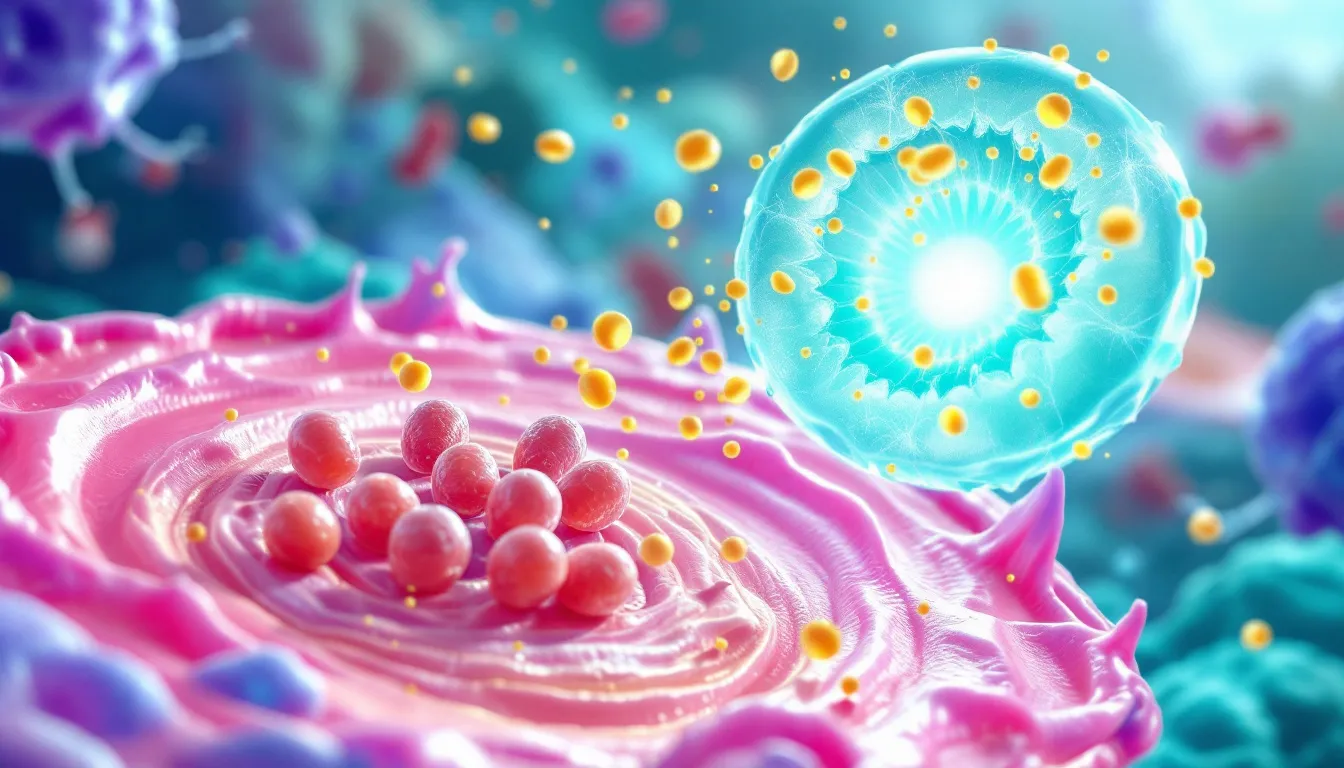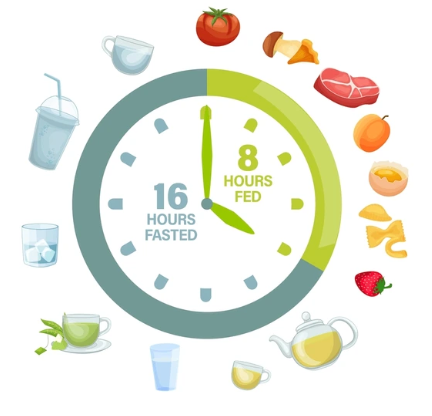Best Practices: How Long to Fast for Autophagy Benefits

What Is Autophagy?
Autophagy is your body’s built-in cellular recycling system. When you fast, your body switches from using glucose for fuel to breaking down old and damaged cells for energy—a process that helps with:
-
Cellular repair
-
Reducing inflammation
-
Supporting longevity
Understanding Autophagy

Autophagy, from the Greek words “auto” (self) and “phagy” (eating), refers to the body’s process of breaking down and recycling damaged or dysfunctional cells. It plays a vital role in detoxifying tissues, preventing cellular damage, and maintaining homeostasis.
The process begins when damaged cellular components are encapsulated in vesicles called autophagosomes, which then fuse with lysosomes—organelles that digest and recycle the contents into energy and raw materials for new cell growth. This not only removes toxic debris but also provides essential nutrients during stress or fasting.
Autophagy is tightly regulated by specific genes, proteins, and enzymes, and is triggered by stress signals like nutrient deprivation, oxidative stress, or infection. Think of it as your body’s self-maintenance system—quietly running in the background to promote longevity and resilience.
Health Benefits of Autophagy Fasting
Autophagy fasting offers a myriad of health benefits, promoting cellular health and overall well-being. One of the primary benefits is the recycling of damaged cellular components, which generates energy and building blocks for new structures. This process helps maintain cellular health and prevents the accumulation of damaged cells, which can lead to various diseases.
Fasting-induced autophagy also enhances immune function by regulating cytokines, essential for the immune response, and stimulating both the innate and adaptive immune systems. This immune system enhancement can help the body fight off infections and improve overall resilience. Additionally, autophagy fasting supports cognitive health by improving brain function and resilience against neurodegenerative diseases.
Metabolic health is another significant benefit of autophagy fasting. By improving insulin sensitivity, autophagy fasting helps regulate blood sugar levels and reduces the risk of metabolic disorders such as diabetes. The process also controls inflammation, further supporting metabolic health and overall well-being.
Autophagy fasting can lead to weight loss and improved body composition by promoting the breakdown of fat stores for energy. This metabolic shift not only aids in weight management but also improves metabolic health and reduces the risk of obesity-related diseases.
In summary, autophagy fasting offers numerous health benefits, including:
-
Enhanced immune function
-
Improved cognitive health
-
Better metabolic health
-
Effective weight management
By understanding and harnessing the power of autophagy, individuals can promote healthy cells and overall well-being.
Listen to our founder Dr Elena Seranova in an interview about Autophagy!
But how exactly can we induce autophagy? The answer lies in one of the most ancient practices known to humanity: fasting.
How Fasting Induces Autophagy

Fasting is highly effective for inducing autophagy, especially intermittent fasting. It is considered one of the best methods for this purpose. When we fast, our bodies undergo a metabolic shift from carbohydrate metabolism to fat utilisation, which is crucial for triggering autophagic processes. This shift is accompanied by a reduction in glucose and insulin levels, key factors that activate the autophagy process. As glucose levels drop and ketones rise, the body begins to recycle damaged or unnecessary cellular components, promoting cellular health and longevity.
One of the primary ways fasting induces autophagy is through the activation of AMP-activated protein kinase (AMPK). AMPK is a critical enzyme that promotes autophagy by inhibiting the nutrient-sensing pathway involving mTOR, another key regulator of autophagy. When nutrient and blood glucose levels are low, such as during fasting, mTOR activity is suppressed, leading to the activation of autophagic processes. This metabolic adaptation helps cells to cope with nutrient deprivation and maintain cellular homeostasis.
Fasting not only triggers autophagy but also enhances its efficiency. The cellular stress signals generated during fasting promote autophagy as a survival mechanism, allowing cells to adapt to adverse conditions and increase their longevity. This adaptive response is faster compared to other methods of caloric restriction, making fasting a highly effective strategy for autophagy induction.
In summary, fasting induces autophagy through a complex interplay of metabolic and cellular changes. By reducing caloric intake, lowering glucose and insulin levels, and activating key enzymes like AMPK, fasting triggers autophagy and promotes the recycling of damaged cellular components. This process not only enhances cellular health but also offers numerous benefits for overall well-being.
But how long should one fast to reap these benefits? Let’s explore the optimal fasting durations for autophagy in the next section.
How Long Should You Fast to Trigger Autophagy?

The duration of fasting required to induce significant autophagy has been a topic of extensive research. While the onset of autophagy typically begins around 17 hours of fasting, significant autophagy benefits are often observed with longer fasting durations. Research suggests that fasting for 24 to 48 hours can lead to more pronounced autophagy effects.
Fasting for 24 hours or more is associated with increased autophagy markers, indicating a heightened autophagic response. This duration allows the body sufficient time to deplete its glycogen stores and switch to fat metabolism, which is crucial for activating autophagy. Fasting for up to 72 hours can further enhance autophagic activity and promote cellular health.
Individual responses to fasting can vary, influenced by factors such as metabolism, age, and overall health. Some individuals may experience significant autophagy benefits with shorter fasting periods, while others may require longer durations to achieve the same effects.
In conclusion, while autophagy can begin as early as 17 hours into a fast, longer durations of 24 to 48 hours are generally recommended for more significant benefits. By understanding the optimal fasting durations for autophagy, individuals can tailor their fasting practices to maximise cellular health and longevity. Next, we’ll delve into the different stages of autophagy during fasting and what happens at each phase.
Stages of Autophagy During Fasting
Autophagy unfolds in distinct stages during fasting, each marked by specific cellular changes and autophagic activity. The initial activation phase typically kicks in around 17 hours of fasting. During this phase, the body begins to form autophagosomes, which encapsulate damaged cellular components for recycling. This early stage is crucial for setting the foundation of the autophagy process.
As fasting continues, the fast for autophagy becomes more pronounced around the 24-hour mark. During this moderate phase, the body ramps up its efforts to break down and recycle damaged cellular components, leading to increased autophagy markers. This stage is characterised by significant cellular changes as the body adapts to nutrient deprivation and enhances its recycling processes.
The peak activity of autophagy is typically observed at around 48 hours of fasting. At this stage, the autophagic activity reaches its highest level, promoting extensive cellular repair and regeneration. This peak phase is essential for maximising the benefits of autophagy, as the body effectively removes damaged cells and generates new, healthy ones.
Understanding the stages of autophagy during fasting can help individuals tailor their fasting practices to achieve the desired health benefits. By recognising the different phases and their associated cellular changes, one can optimise the fasting duration for maximum autophagic activity. Next, we will explore the factors that influence the onset of autophagy and how individual differences can affect the process.
Factors Influencing Autophagy Onset
Several factors can influence the onset of autophagy during fasting, making the process highly individualised. One of the primary factors is an individual’s metabolism. Those with a faster metabolism may experience the onset of autophagy sooner than those with a slower metabolic rate. Hormonal balance also plays a critical role in regulating autophagy. Hormones such as insulin, glucagon, and growth hormone can either promote or inhibit autophagic activity, affecting how quickly autophagy is triggered during fasting.
Environmental factors such as temperature and oxygen levels can also impact the regulation of autophagy. Exposure to cooler temperatures has been shown to stimulate autophagy, possibly due to the increased metabolic demands placed on the body to maintain core temperature. Similarly, hypoxia, or low oxygen levels, can trigger autophagy as a cellular survival mechanism. These environmental factors highlight the complex interplay between internal and external conditions in regulating autophagic processes.
Understanding these factors can help individuals better tailor their fasting practices to achieve optimal autophagy benefits. By considering metabolic rate, hormonal balance, and environmental conditions, one can optimise the timing and duration of fasting to enhance autophagic activity. Next, we will discuss dietary strategies to further enhance autophagy and promote overall cellular health.
Enhancing Autophagy with Diet
Dietary strategies can significantly enhance autophagy, complementing the effects of fasting. One of the most effective dietary approaches is the ketogenic diet, which is high in fats and low in carbohydrates. This diet promotes ketosis, a metabolic state where the body uses fat as its primary energy source, thereby stimulating autophagy. By limiting carbohydrate intake and maintaining protein consumption below 20 grams daily, individuals can enhance autophagic activity and promote cellular health.
Calorie restriction is another powerful dietary strategy for inducing autophagy. Reducing calorie intake by 10 to 40 percent can activate autophagy, helping the body to remove damaged cellular components and improve overall cellular health. This reduction in calorie intake mimics the effects of fasting, promoting the recycling of cellular components and enhancing metabolic health.
Certain foods and beverages can also promote autophagy. For example, polyphenol-rich foods such as berries and spices have been shown to facilitate autophagy activation. Additionally, consuming coffee and cacao may enhance autophagic processes, providing an easy and enjoyable way to support cellular health. These dietary choices can complement fasting practices and further stimulate autophagy.
Excessive protein consumption can inhibit autophagy by suppressing autophagic activity. Therefore, maintaining a balanced diet with moderate protein levels is essential for promoting autophagy. By incorporating these dietary strategies, individuals can enhance autophagic activity and promote overall cellular health.
Complementary Methods to Activate Autophagy
In addition to diet and fasting, several complementary methods can help activate autophagy and enhance cellular health. Here are some effective methods:
-
Exercise: Particularly high-intensity interval training (HIIT) and moderate-intensity exercise are highly effective for inducing autophagy.
-
Triggers: Exercise triggers autophagy, especially in muscle tissue, promoting the recycling of damaged cellular components and enhancing overall cellular function.
-
Complementing Fasting: Regular physical activity can thus complement fasting practices and boost autophagic activity.
Biohacking tools such as red light therapy and hyperbaric oxygen therapy are also recognised for their ability to enhance autophagy. Red light therapy uses specific wavelengths of light to stimulate cellular processes and promote autophagy. Similarly, hyperbaric oxygen therapy involves breathing pure oxygen in a pressurized environment, which can enhance cellular repair and autophagic activity. These biohacking tools provide innovative ways to support cellular health and promote autophagy.
Other methods that induce cellular stress, such as cold exposure, can also promote autophagy. Activities like cold showers or ice baths create a stress response in cells, triggering autophagic processes and enhancing cellular resilience.
Another powerful tool to complement fasting and support autophagy is berberine, a bioactive compound often referred to as “nature’s metformin.” Berberine activates AMPK, the same cellular energy sensor triggered by fasting, which plays a key role in initiating autophagy. It also the amazing benefits of Berberine, supports metabolic flexibility, and helps regulate blood glucose—creating the ideal internal environment for autophagy to thrive. When taken during or around fasting windows, berberine can amplify fat-burning, cellular repair, and longevity benefits, making it an excellent addition to any autophagy-focused lifestyle. Learn more about the amazing benefits of Berberine here!
Breaking Your Fast for Maximum Benefits
Breaking a fast correctly is essential for maximising the benefits gained during the fasting period. Start with gentle, nutrient-dense foods that are easy to digest. Good, healthy fats like avocado, MCT oil, grass-fed ghee, or butter are ideal for breaking a fast. These fats provide essential nutrients and are easy on the digestive system, helping to ease the transition back to regular eating.
Foods such as eggs and avocados are also excellent choices for post-fast meals due to their high nutrient and healthy fat content. Smoothies can be a suitable option as well, offering a lower fiber content compared to whole fruits, which can be easier on the digestive system. It’s advisable to avoid heavy, rich foods that could cause digestive discomfort, as well as processed and high-sugar foods that can negate the health benefits gained during the fast.
Be cautious of overeating after fasting, as this can lead to digestive issues and negate the benefits of autophagy fasting. By gradually reintroducing nutrient-dense foods and maintaining a balanced diet, individuals can maximise the health benefits of autophagy fasting and promote overall well-being.
Risks and Considerations
While autophagy fasting offers numerous potential health benefits, it is not without risks and considerations. Excessive autophagy during prolonged fasting can lead to harmful cell death, known as type II autophagic cell death, which can compromise cellular health. Additionally, prolonged fasting can exacerbate existing medical conditions by disrupting metabolic homeostasis and leading to insufficient energy intake.
Individuals on blood-pressure or blood sugar medication should consult with a healthcare provider before embarking on an autophagy fasting regimen. The lack of proper medical supervision can lead to serious health risks, including electrolyte imbalances and dehydration. Adequate nutrient intake is also crucial to avoid adverse effects from excessive autophagic activity and nutrient deficiencies.
Psychological stress and negative impacts on mental health are other potential risks of prolonged fasting without proper guidance. Therefore, safety considerations are critical, and individuals should seek professional advice before beginning prolonged fasting for autophagy benefits. By understanding these risks and taking appropriate precautions, individuals can safely and effectively harness the benefits of autophagy fasting.
Summary
In conclusion, autophagy is a vital cellular process that plays a significant role in maintaining cellular health and overall well-being. Through fasting, we can effectively trigger autophagy, promoting the recycling of damaged cellular components and enhancing immune function, cognitive health, and metabolic health. By understanding the optimal fasting durations, dietary strategies, and complementary methods to enhance autophagy, individuals can tailor their practices to maximise the benefits of this natural process.
As with any health regimen, it’s essential to consider the potential risks and consult with healthcare professionals to ensure safe and effective practices. By doing so, we can unlock the transformative power of autophagy fasting and promote healthier aging and overall well-being. Ready to embark on your autophagy fasting journey? Remember, the key to success lies in understanding your body’s needs and responding to them with care and mindfulness.
Frequently Asked Questions
What is the purpose of autophagy?
Autophagy plays a crucial role in cellular health by removing damaged components, thereby facilitating the regeneration of healthier cells and promoting longevity.
How does fasting relate to autophagy?
Fasting directly promotes autophagy by decreasing caloric intake and lowering glucose and insulin levels, activating key autophagic pathways. This process helps in cellular repair and maintenance, highlighting fasting's beneficial role in health.
What is the approximate duration of fasting involved in autophagy fasting?
To effectively induce autophagy, fasting for approximately 24 to 48 hours is recommended, although it may start around 17 hours.
What are some benefits of autophagy?
Autophagy can significantly improve your immune function, support the creation of new healthy cells, enhance cognitive abilities, and promote better metabolic health. Embracing this process can lead to overall better well-being.
What should you eat to break a fast in autophagy fasting?
To effectively break a fast during autophagy fasting, focus on consuming healthy fats such as avocado, MCT oil, or grass-fed ghee, as they are nutrient-dense and gentle on your digestive system.
Researched and reviewed by Dr Elena Seranova, Ph.D.
Dr Seranova holds a master's degree in Translational Neuroscience from the University of Sheffield, UK, and a Ph.D in Stem Cell Biology and Autophagy from the University of Birmingham, UK. She is a published author in multiple peer-reviewed journals, including Cell Reports and Developmental Cell.
LEARN MORE!
Confused about supplement dosing?
Get a personalised recommendation in under a minute.
For more information or inquiries, feel free to contact us.







Leave a comment